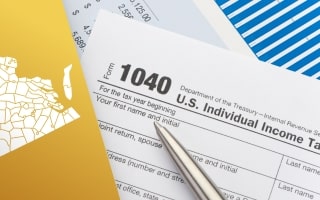Property Tax Records in Virginia

If you purchase a property in Virginia, you'll pay property taxes every year. These taxes are collected by city and county governments to pay for various public services. In Virginia, the average property tax rate is around 0.75%, which is considerably lower than the 0.99% national average. Keep in mind, however, that property values in many locations throughout Virginia are high, which is why annual tax payments can amount to several thousand dollars.
For the local government to calculate your property taxes, they must first identify the value of your home. Local assessors are tasked with evaluating properties every few years. Once an assessor identifies the current market value of a property, they can determine its assessed value. Since Virginia property taxes are local, counties, towns, and cities can assess homes and apartment buildings. This process ensures that property taxes are reflective of current market conditions and local funding needs.
Property taxes are typically due in two installments. While the due dates for these payments can vary with each county, they are usually required in July and December every year. You'll receive your tax bills around four weeks before they are due.
Virginia began to tax property owners in 1782. For the next 26 years, copious tax records were kept by the Virginia government. In 1808, however, commissioners in Virginia were told to avoid collecting taxes or compiling lists of taxpayers. This change was eventually reversed in 1864.
Property Tax Assessment in Virginia

To calculate property taxes in Virginia, you must multiply the assessed value of a home by its tax rate. As touched upon previously, local assessors evaluate properties to identify market values. They are required by the state to assess values every two, four, or six years. Counties must assess home values every four years. In comparison, cities are tasked with doing so every two years. Smaller counties and cities can decide to reassess every four or six years.
During a reassessment, the assessor will identify the market value of your home, which is the amount that the property would likely sell for. If the Virginia property assessment is incorrect, you may be tasked with paying high taxes for years, which is why you should appeal any valuation that you disagree with.
In some states, the assessment value on which taxes are based differs considerably from the market value. However, the assessment value in Virginia usually ranges from 80% to 90% of the market value. Let's say that the assessment ratio in your county is 82%. If your home has a market value of $300,000, its assessed value will be $246,000.
Virginia tax rates are determined by local governments and the taxing districts within each city and county. You can calculate your taxes by multiplying your home's market value by the effective tax rate in your county. If your county has an effective tax rate of 0.60%, your annual Virginia property taxes will be $1,800. The tax rates in the most populous Virginia counties are:
- Fairfax County: 1.03%
- Prince William County: 1.05%
- Virginia Beach City: 0.93%
- Loudoun County: 1.08%
- Chesterfield County: 0.88%
As you can see, Fairfax County property taxes are some of the highest in Virginia. As it's the most populated county, this makes sense, though even less populated counties don't have extremely low taxes.
Calculate Virginia Taxes
A Virginia property tax calculator is a practical resource for homeowners and real estate investors who want to better understand how property taxes are determined throughout the state. In Virginia, property taxes are assessed and collected at the local level by counties, cities, and towns, with rates and assessment practices varying by jurisdiction. This calculator allows users to input key property details, such as location, assessed value, and property type, to estimate annual tax assessments and liabilities based on local real estate tax rates.
The tool can also help identify potential exemptions and property tax relief programs available to Virginia residents. These may include the Real Estate Tax Relief for the Elderly and Disabled, which offers full or partial exemptions based on income and net worth, and exemptions for 100% service-connected disabled veterans and their surviving spouses. By using the calculator, property owners can estimate their potential tax obligations and explore savings opportunities based on their individual circumstances.
using our property tax calculator.
Virginia Property Tax Records: What Are They?

Whenever you make a property tax payment, your county will collect the money and combine it with other tax revenues to pay for a wide range of services and institutions. The counties and cities that collect tax revenues can determine what to do with the money based on their annual budgets.
If you find a home that you're interested in buying but want to discover more about the property and the amount of taxes you'll be expected to pay, you can find this information through tax records. While the data that's available in these records can vary from county to county, you should receive important details about the home you're researching and its current valuation.
Once you find the online database for the county or city you live in, you can search for a home with parameters like address or map number. In Fairfax County, you can look for the property on a map. The records you gain access to should include the following details, which can help you better understand the property's value and history:
-
Owner name
-
Mailing address
-
Map number
-
Utilities
-
Land use code
-
Zoning description
-
Legal description
-
Previous sales information, including dates and prices
-
Current market value and assessed value
-
Historical values for the past 24 years
-
Total property taxes, which are separated into first-half and second-half payments
-
Year built
-
Architectural style
-
Number of bedrooms and bathrooms
-
Physical condition and construction quality
-
Map
-
Square footage
-
Attached accessory structures
Property Tax Exemptions and Deductions in Virginia

While Virginia property taxes are lower than many other states, you can further reduce the amount you pay every year by seeking an exemption or deduction. Virginia provides homeowners with several tax exemptions for which they might qualify. Most of these Virginia property tax exemptions only require you to apply once. If you qualify, the tax break will remain in place for subsequent property tax payments.
Tax Relief for Seniors and Disabled Individuals: If you are at least 65 years old or disabled, you may qualify for this tax exemption. This form of tax relief covers as much as 125% of the average assessed value for all homes in the county you reside in. You'll need to file your application by May 1 to qualify. There are some income limits that you'll need to consider, which are detailed below:
- Total combined income of $60,000 or less: 100% relief
- Total combined income of $60,001 to $70,000: 75% relief
- Total combined income of $70,001 to $80,000: 50% relief
- Total combined income of $80,001 to $90,000: 25% relief
Seniors can also apply for a property tax deferral.
Disabled Veteran Exemption: To qualify for this exemption, you must have a service-connected disability that's rated at 100%. If you have a total and permanent disability that's less than 100%, you can still qualify if you receive VA benefits at the 100% rating because you're unemployable. Disabled veterans who qualify for this exemption won't need to pay Virginia property taxes. Surviving spouses can also claim the tax break.
How To Search Property Tax Records in Virginia

If you want to learn about a home that you're interested in buying in Virgina, there are a few methods you can use to search for property tax records. For example, you can use the tax records that your county maintains in an online database. You can also conduct your search with a third-party solution like PropertyChecker.
While most counties in Virginia offer online databases for property tax records, these websites aren't always easy to find. PropertyChecker provides a one-stop solution that you can use to search for tax records of multiple properties. When you reach the PropertyChecker website, you can search for a home with different parameters, which include the address, owner's name, phone number, and parcel ID. Once you find the property, you'll be able to review the following types of information:
-
Property tax records
-
Assessed and market values
-
Deed records
-
Foreclosure records
-
Building permit details
-
Property owner names
-
Sales history
-
Lien records
-
Loan records
-
Neighborhood information
-
Property details, which include year built, square footage, and renovations
How To Appeal Property Taxes in Virginia

When your home is reassessed by the county or city you live in, you'll receive a notice of change in assessment if the value of your property increases or decreases. These notices should be mailed by March 1. If you believe that your home's assessment value is inaccurate, you can file an appeal to ensure you are not overpaying on your property taxes.
Step 1: The initial stage of the appeals process involves requesting an informal review with the county or city assessor who sets the value of your home. Once you receive a notice that your Virginia property assessment has changed, you have 30 days to file an appeal.
During the review, the department may inspect your home in person and explain why they made a specific valuation. The assessor may choose to change the value of your home immediately, which means that the appeals process is done.
Step 2: If you don't agree with the department's decision, you can appeal to the County Board of Equalization. When you submit your application, make sure that you include evidence that supports your argument. The Board of Equalization will set a hearing date that you must attend if you want the assessment value to be changed. If the Board's decision isn't favorable, you can appeal it to the local Circuit Court.
Step 3: The third and final step in the appeals process involves appealing to the Tax Commissioner to request that your tax bill be adjusted. You'll have 90 days to submit this request after the date of assessment. Keep in mind that this step can be completed after the informal review.
How Property Tax Records Impact Real Estate Transactions in Virginia

Property taxes are a point of concern for many buyers, sellers, and investors who take part in real estate transactions throughout Virginia. While the tax rate in Virginia is below the national average, it can still add a couple hundred dollars to a buyer's monthly mortgage payments. An investor who's looking to add another property to their portfolio will need to consider how difficult it will be to make a rental profitable while paying property taxes.
Since counties have different tax rates, investors and buyers may consider looking at homes in different locations if the property taxes in one county or city are too high. For example, the effective tax rate in Falls Church City is 1.23%, which is among the highest in Virginia.
The median home value in Falls Church City is right around $770,000, which means that buyers and investors can expect to pay an average of $9,471 in annual property taxes. In Arlington County, the median home value is $660,000. However, the effective tax rate is just 0.90%, which leads to a much lower property tax bill of $5,940. Even a small variance in Virginia property tax rates can make a big difference in property taxes.
Sellers must consider property taxes when pricing their homes. If a seller lives in a county or city with some of the highest property tax rates in Virginia, they may benefit from pricing their home more competitively. An investor will also consider property taxes when calculating the profits an investment can earn.
Investors often obtain Virginia property tax records when researching investments. These records allow an investor to identify a property's current market value, which makes it possible for them to calculate their annual taxes.
In Virginia, homeowners are tasked with paying property taxes in two installments, typically due in July and December. If a homeowner doesn't pay their taxes in full by the second installment's due date, their taxes can become delinquent. While the second installment is usually due on December 5, the taxes won't become delinquent until January 1.
Even though many states place tax liens on properties and sell lien certificates to investors, Virginia doesn't allow this type of sale. Instead, your local government can sell your property via a public auction. Most counties and cities host these auctions once or twice per year.
Keep in mind that your county can't foreclose on your home and sell it to investors for two years after your taxes become delinquent. After two years have passed, you can still reclaim ownership of your home by paying your outstanding taxes. However, once an investor bids on the property and pays the remaining taxes, you'll lose ownership of the home forever.
Free Virginia Property Tax Lookup
Tax Records Please wait...
Property Tax Guide
- Property Tax Records in Virginia
- Property Tax Assessment in Virginia
- Virginia Property Tax Records: What Are They?
- Property Tax Exemptions and Deductions in Virginia
- How To Search Property Tax Records in Virginia
- How To Appeal Property Taxes in Virginia
- How Property Tax Records Impact Real Estate Transactions in Virginia
Instant Access to Virginia Property Records
- Owner(s)
- Deed Records
- Loans & Liens
- Values
- Taxes
- Building Permits
- Purchase History
- Property Details
- And More!
Free Virginia Property Tax Lookup
Tax Records Please wait...
Property Tax Guide
- Property Tax Records in Virginia
- Property Tax Assessment in Virginia
- Virginia Property Tax Records: What Are They?
- Property Tax Exemptions and Deductions in Virginia
- How To Search Property Tax Records in Virginia
- How To Appeal Property Taxes in Virginia
- How Property Tax Records Impact Real Estate Transactions in Virginia